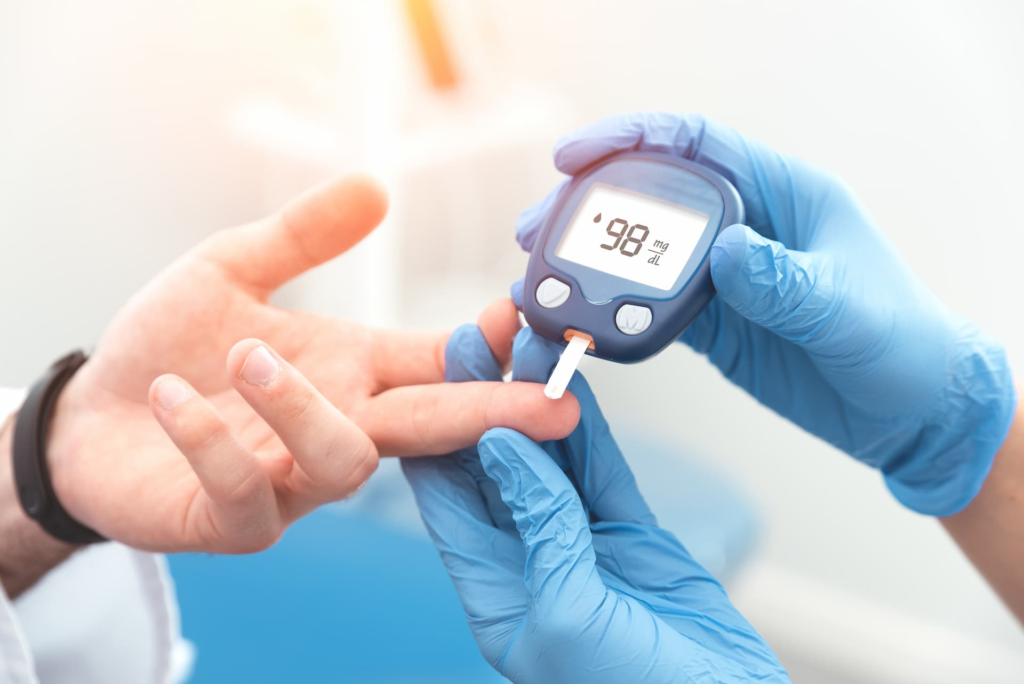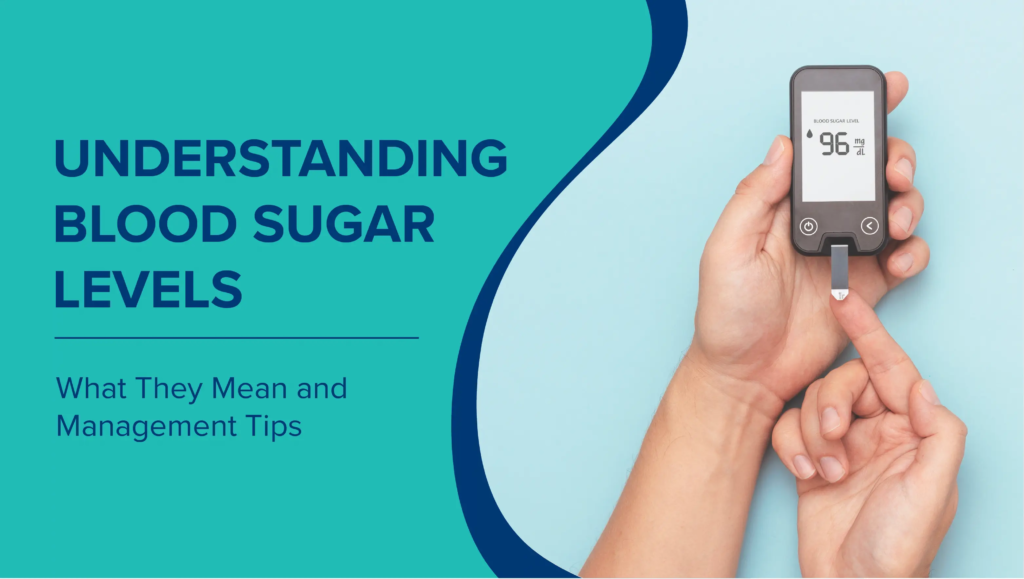
Introduction
Blood sugar management has become one of the most important aspects of health and wellness in today’s world. With increasing consumption of processed foods, sedentary lifestyle, stress, and lack of physical activity, cases of high blood sugar and diabetes are rising rapidly. When blood sugar levels remain uncontrolled for a long period, they damage vital organs like the heart, kidneys, eyes, and nerves.
The good news is that with the right diet, regular exercise, stress management, and natural remedies, blood sugar levels can be controlled effectively. In this article, we’ll explore what blood sugar is, its causes, symptoms, complications, and the best natural strategies to manage it.
What is Blood Sugar?
Blood sugar (or blood glucose) is the body’s main source of energy. When we consume carbohydrates, the body converts them into glucose, which circulates in the bloodstream. The hormone insulin, secreted by the pancreas, helps transport this glucose into cells for energy.
- Normal fasting blood sugar: 70–100 mg/dl
- Pre-diabetic range: 100–125 mg/dl
- Diabetic range: 126 mg/dl or above
If insulin doesn’t function properly or the body develops insulin resistance, glucose stays in the blood instead of reaching the cells, leading to high blood sugar or diabetes.
Causes of High Blood Sugar
Several factors can cause high blood sugar levels:
- Excess intake of refined carbs and sugar
- Overeating and irregular meal timing
- Physical inactivity
- Stress and lack of sleep
- Obesity, especially belly fat
- Family history of diabetes
- Certain medications (e.g., steroids)
Symptoms of High Blood Sugar
High blood sugar often shows clear warning signs. Common symptoms include:
- Frequent urination
- Excessive thirst
- Increased hunger
- Fatigue and weakness
- Blurred vision
- Slow healing of wounds
- Sudden weight changes
Importance of Blood Sugar Management
Uncontrolled blood sugar is dangerous and can lead to several health complications:
- Heart disease and stroke
- Kidney damage (diabetic nephropathy)
- Eye problems (diabetic retinopathy, blindness)
- Nerve damage (neuropathy)
- Weak immune system
- Slow wound healing
Proper blood sugar management not only prevents diabetes but also protects overall health.
Best Diet for Blood Sugar Management
Foods to Include
- Whole grains – Brown rice, oats, quinoa, whole wheat bread
- Fruits rich in fiber – Apples, pears, guava, berries
- Vegetables – Spinach, broccoli, kale, cucumber
- Protein sources – Lentils, beans, paneer, fish, lean chicken
- Healthy fats – Olive oil, flaxseeds, chia seeds, walnuts
- Low-fat dairy – Skimmed milk, yogurt
Foods to Avoid
- Refined sugar, sweets, pastries
- White bread, pasta, maida products
- Deep-fried foods and junk food
- Sugary beverages, sodas, energy drinks
- Packaged processed foods
Lifestyle Tips for Blood Sugar Management
Lifestyle plays a crucial role in blood sugar management. Here are some effective tips:
- Regular Exercise – At least 30–45 minutes of brisk walking, yoga, cycling, or swimming daily.
- Maintain Healthy Weight – Especially reduce abdominal fat to improve insulin sensitivity.
- Proper Sleep – 7–8 hours of restful sleep helps regulate hormones and blood sugar.
- Stress Management – Meditation, deep breathing, or hobbies can lower stress-related sugar spikes.
- Small, Frequent Meals – Eat 4–5 smaller meals instead of large heavy meals.
Natural Remedies for Blood Sugar Control
Certain natural remedies have been used for centuries to help control blood sugar levels.
- Fenugreek seeds (Methi) – Soaked overnight and consumed on an empty stomach.
- Cinnamon – Improves insulin sensitivity and lowers glucose.
- Amla (Indian Gooseberry) – Boosts pancreatic function and insulin secretion.
- Jamun and Neem – Herbal remedies for natural sugar balance.
- Aloe Vera – Helps stabilize glucose levels when consumed regularly.
Blood Sugar Monitoring
Monitoring is essential for blood sugar management.
- Glucometer – For daily at-home checks
- HbA1c Test – Shows average sugar levels for the past 3 months
- Continuous Glucose Monitoring (CGM) – Wearable devices for real-time sugar tracking

Exercise for Blood Sugar Control
Physical activity increases insulin sensitivity and helps use glucose as energy. Recommended exercises include:
- Brisk walking
- Yoga (sun salutation, pranayama)
- Strength training with light weights
- Aerobic workouts – cycling, jogging, swimming
- Stretching and mobility exercises
Daily Routine for Balanced Sugar Levels
- Morning light exercise or yoga on an empty stomach
- High-fiber and protein-rich breakfast
- Mid-morning fruit snack
- Lunch – salad, lentils, roti, vegetables
- Evening – green tea and handful of nuts
- Light dinner, eaten early
- Short walk after dinner before bedtime
Supplements for Blood Sugar Management
Some natural supplements may support sugar balance:
- Chromium
- Berberine
- Alpha-lipoic acid
- Herbal blends (fenugreek, bitter melon, gymnema sylvestre)
⚠️ Always consult a doctor before starting any supplement.
Preventive Tips for Long-Term Sugar Balance
- Regular medical check-ups
- Avoid smoking and alcohol
- Reduce processed foods
- Stay hydrated throughout the day
- Stay physically active and manage weight
FAQs on Blood Sugar Management
Q1: Do I always need medication to control blood sugar?
Not always. In early stages, lifestyle changes, diet, and exercise can naturally lower blood sugar without medication.
Q2: Can diabetic patients eat fruits?
Yes, but only low-GI fruits like apple, guava, papaya, and berries in moderation.
Q3: Does stress increase blood sugar?
Yes, stress hormones like cortisol increase blood glucose and affect insulin function.
Q4: How often should I check my blood sugar?
- Diabetic patients: 2–3 times daily using a glucometer.
- Non-diabetics: Once or twice a year for preventive health check-ups.
Conclusion
Blood sugar management is not just about taking medicines – it’s about adopting a healthy lifestyle. With balanced nutrition, regular physical activity, stress management, and natural remedies, blood sugar can be controlled effectively.
By following the right habits and monitoring your levels regularly, you can not only prevent diabetes but also protect your heart, kidneys, eyes, and nerves from long-term damage.
Healthy living is the key to balanced sugar levels and long-term wellness.

